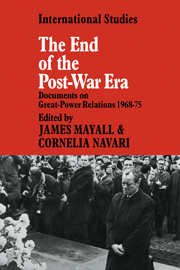Book contents
- Frontmatter
- Contents
- Preface
- Source Abbreviations
- Note on the texts of the documents
- Introduction
- I THE END OF THE COLD WAR
- II THE DIPLOMACY OF DETENTE
- III CHANGES IN THE WESTERN ALLIANCE
- IV THE WARSAW TREATY ORGANISATION
- V THE GREAT POWERS AND THE MIDDLE EAST WAR OF OCTOBER 1973
- VI THE CRISIS OF THE INTERNATIONAL ECONOMIC ORDER
- A The International Monetary System
- B The Framework of International Trade
A - The International Monetary System
Published online by Cambridge University Press: 07 October 2011
- Frontmatter
- Contents
- Preface
- Source Abbreviations
- Note on the texts of the documents
- Introduction
- I THE END OF THE COLD WAR
- II THE DIPLOMACY OF DETENTE
- III CHANGES IN THE WESTERN ALLIANCE
- IV THE WARSAW TREATY ORGANISATION
- V THE GREAT POWERS AND THE MIDDLE EAST WAR OF OCTOBER 1973
- VI THE CRISIS OF THE INTERNATIONAL ECONOMIC ORDER
- A The International Monetary System
- B The Framework of International Trade
Summary
Communiqué issued following the meeting of the Governors of the Central Bank of the seven ‘Gold Pool’ nations, Washington, 17 March 1968
The Governors of the Central Banks of Belgium, Germany, Italy, the Netherlands, Switzerland, the United Kingdom, and the United States met in Washington on March 16 and 17, 1968 to examine operations of the gold pool, to which they are active contributors. The Managing Director of the International Monetary Fund and the General Manager of the Bank for International Settlements also attended the meeting.
The Governors noted that it is the determined policy of the United States Government to defend the value of the dollar through appropriate fiscal and monetary measures and that substantial improvement of the US balance of payments is a high priority objective.
They also noted that legislation approved by Congress makes the whole of the gold stock of the nation available for defending the value of the dollar.
They noted that the US Government will continue to buy and sell gold at the existing price of $35 an ounce in transactions with monetary authorities. The Governors support this policy, and believe it contributes to the maintenance of exchange stability.
The Governors noted the determination of the UK authorities to do all that is necessary to eliminate the deficit in the UK balance of payments as soon as possible and to move to a position of large and sustained surplus.
- Type
- Chapter
- Information
- The End of the Post-War EraDocuments on Great-Power Relations 1968-1975, pp. 565 - 584Publisher: Cambridge University PressPrint publication year: 1980

